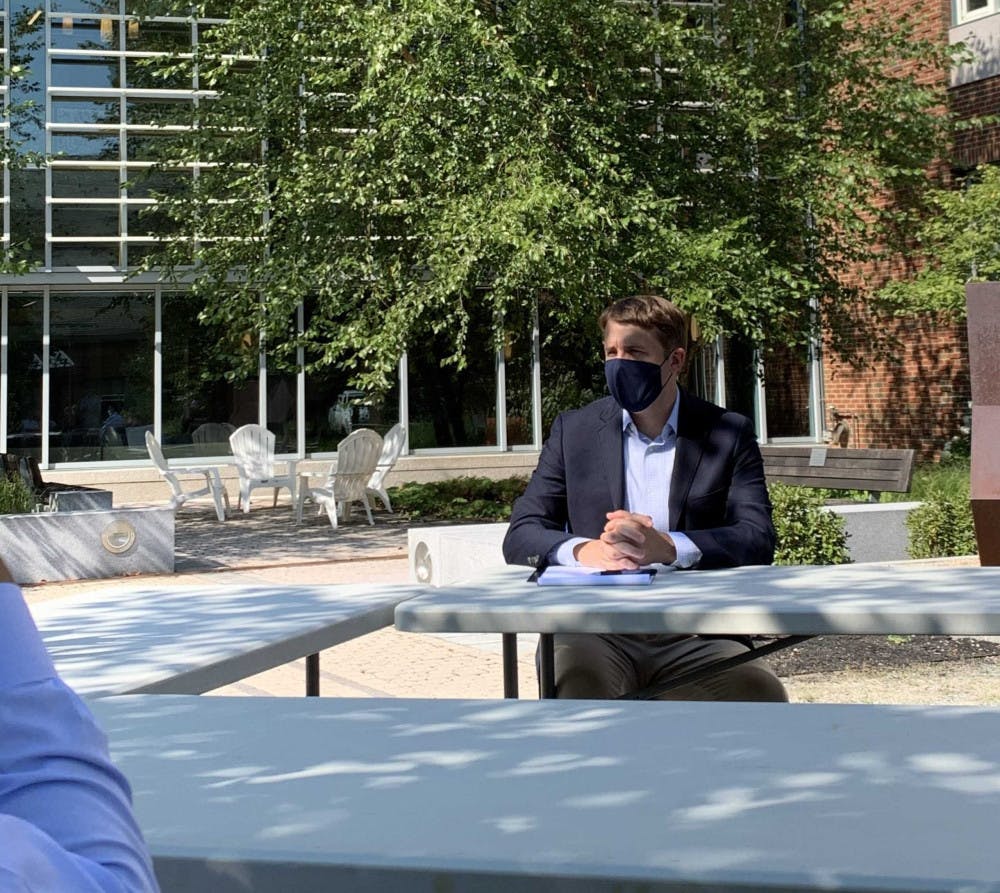On Aug. 26 Congressman Chris Pappas discussed voting rights in a round table with young NH Democrats. Pappas was joined by State Rep. Cam Kenney, State Rep. Cassie Levesque, Candidate for State Representative Heath Howard, and Oyster River High School Student Body President Ella Gianino. They were concerned about legislative efforts in both Concord and Washington to suppress the youth vote.
“We talk about how we want to engage the youth vote, but we have leaders who want to just roll up the welcome mat when it comes to participating in our elections,” said Pappas, who started off the conversation by discussing the Protect the Youth Vote Act that Pappas filed in US Congress alongside other colleagues.
The bill looks at the 26th Amendment in the US constitution, which guarantees any US citizen 18-years or older has a right to participate in local and federal elections. The bill will allow the Justice Department to identify and take correction actions against barriers that are impeding the 26th Amendment. Examples of these types of barriers are changing or reducing polling locations and requiring additional forms for same day voter registration.
“We are hoping that as we approach November despite this pandemic that everyone’s voice Is going to be heard and I think we are in a longer-term struggle to make sure that we stop political efforts to undermine access to voting because it is so crucial,” said Pappas while discussing the bill.
Kenney came to New Hampshire in 2014 as an out-of-state student from Massachusetts. He described how it was easy for him to vote and get involved in democracy when he first came to campus but said that voter legislation passed since 2014 has made it harder for students to participate in elections. “A lot of the more current disenfranchise bills hit Concord and then I saw my constituents have to push past many barriers to get their vote in,” said Kenney.
Kenney is referring to Senate Bill 3 (SB3) and House Bill 1264 (HB1264). SB3 was passed in 2017 and requires those registering to vote in New Hampshire to provide proof of their address. HB1264 was passed in 2018 and asks voters “to demonstrate a current intent to designate that place of abode as his or her principal place of physical presence [for the indefinite future] to the exclusion of all others.” Many politicians including Kenney and Howard believe that these laws are barriers that prevent students from voting in Durham since many college students may not have proof of domicile or the intent to make their college town their permeant residence. HB1264 is currently being contested in the New Hampshire Supreme courts.
The participants also discussed the need to mobilize the youth vote. Gianino, although unable to vote, is encouraging her classmates who are old enough to go to the polls and engage in politics. “I see a trend of general apathy with the classmates I have in terms of politics because it is so dissident right now and might not seem interesting,” Gianino said. She believes the way to get youth more involved in voting is by demonstrating that politics is interesting and touches many facets of student’s everyday lives. “I think that politics is so great because there are so many different facets to it…everything there and I think that is something that young people do not realize,” said Gianino.
Despite expressing their different concerns, all the people at the table expressed optimism about the current involvement of young people in politics. The midterm elections in 2018 had the highest youth voter turnout in US history. Gianino said she has recognized a recent rise in activism among her high school classmates. Kenney agreed and said “students seem to understand that this election is the most important in their lifetime even if they are young.”













